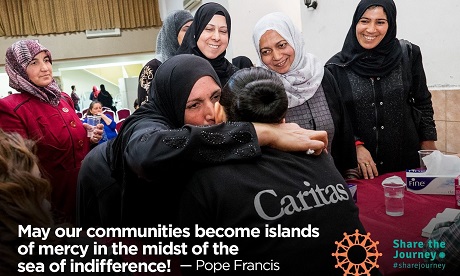In four years participants in a Caritas campaign have logged about 600,000km in symbolic solidarity walks with migrants and refugees.
The global “Share the Journey” campaign aims to build “bridges of hope between islands separated by fear,” says Cardinal Luis Antonio Tagle, president of Caritas Internationalis.
Although the campaign has formally ended, its message continues. Communities are encouraged to change attitudes toward immigration by getting them to know their migrant neighbours.
“We gave ourselves a few challenges: not just seeing the migrants but looking at them with compassion; not just hearing their voice but listening to their stories and concerns; not just passing by the other side but stopping, as the good Samaritan, and living a moment of communion with them,” Tagle says.
Anyone can get involved.
They can go on a sponsored or symbolic solidarity walk with refugees, invite migrants to shared meals, or light a virtual candle.
Some people may want to share messages or stories, which will be gathered into a compilation for Pope Francis.
Asked about ways to measure the success of the four-year “Share the Journey” campaign, both Aloysius John, secretary-general of Caritas Internationalis and Tagle spoke of individual encounters where people were “converted” to recognizing the migrant in their midst as a brother or sister.
“People have been touched in different ways, touched by the suffering,” says John.
The ongoing campaign hopes to develop “a new consciousness, a new way of looking at people on the move and developing this culture where, instead of fear of the ‘other,’ we see a human person and we give them the love, the attention, that we know every human being deserves,” Tagle says.
“We cannot set a time frame; we cannot say, ‘At the end of 2021 everyone, including Caritas workers, should have been converted already.’ We hope that happens, but knowing human freedom and human frailty,” some people will need more time.”
With the COVID-19 pandemic continuing and with many nations claiming a need to protect their own citizens first, we face “the risk of intensifying selfishness and the fear of strangers,” Tagle says.
The call is for everyone to show solidarity and ” continue to share the journey with migrants, especially at this most difficult moment.”
“The mission continues,” Tagle says.
“Where there is indifference and intolerance toward migrants, Caritas will stand by them to express the love and concern of the Mother Church,” John says.
His comment is echoed by Msgr Bruno-Marie Duffé, secretary of the Dicastery for Promoting Integral Human Development.
He notes the campaign’s key elements reflect Catholic teaching on migrants, beginning with the fact that they are human beings with dignity and rights to be protected.
Everyone has a journey, an intimate pain that haunts them and each of them has a hope: to be considered as a person, to be called by name, to be welcomed and recognized, he says.
Source
Additional readingNews category: World.




